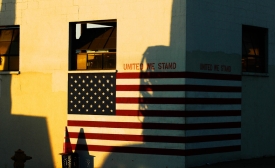building bridges

Omari Faulkner emphasizes dialogue and engagement in order to bridge the divide between us and those with whom we may not agree.
In recent months the United States has witnessed a heavy dose of partisan politics driving the nation’s dialogue, creating a deeper divide on important issues. In the process we have used political figures as scapegoats for the impairment caused by this very division. If this destructive pattern does not end, we will drain our most powerful resource for healing and understanding – I call it “domestic diplomacy,” dialogue that engages people to find commonalities and join together as one.
Indian Council for Cultural Relations (ICCR), in association with J&K Academy of Art Culture and Languages organized the screening of world famous play ‘When We Dead Awaken’ written by Henrik Ibsen and directed by India’s most celebrated internationally acclaimed theatre director Ratan Thiyam here at Abhinav Theatre Jammu.
As part of the International Peace Foundation's mission to build cultural bridges, Aaron Ciechanover, Finn E. Kyland, and Sir Richard Roberts held seminars at three North Korean universities.
Even as official talks between India and Pakistan continue to stagger, track-two diplomacy is flowing in Dubai, with politicians from both sides discussing better governance and bridge building. On Tuesday, more than a dozen parliamentarians, media bosses and technocrats from both sides convened in Dubai for a dialogue on governance.
As we stand at the intersection of technology and storytelling, we see a future that makes it easier to both tell and preserve stories. This might mean a school child sharing her electronic book with a faraway grandparent, a group of women entrepreneurs in underdeveloped countries chronicling their experiences, a preschool-aged future author writing his first book or elderly people all over the world passing along their histories and that of their communities.







